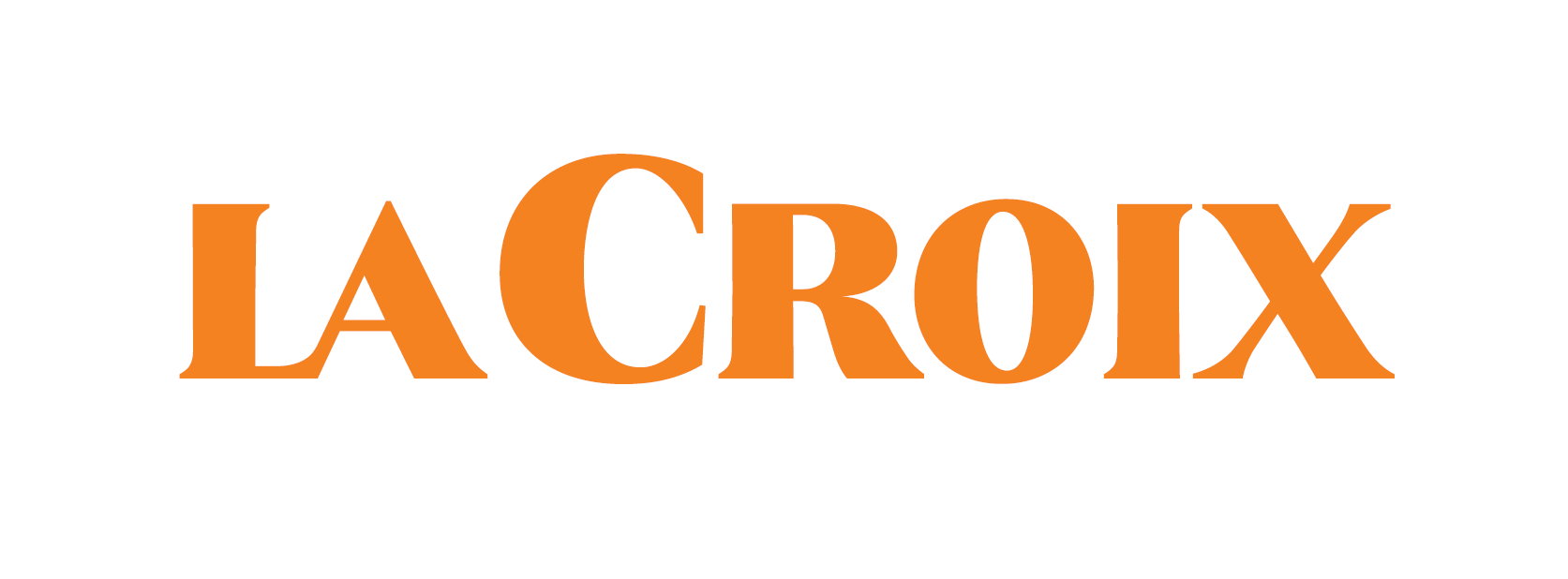

Russia’s spat with EU puts relations into deep-freeze
Kremlin stance is blow to European countries which favour outreach to Moscow. Russia’s combative treatment of the EU’s top diplomat during a landmark trip there has triggered a political outcry — but little expectation that the European bloc will end divisions over how to handle the Kremlin.
What are the impact of the COVID-19 crisis on Japan's economic security?
In this interview, Shin Oya, Senior Consulting Fellow, Asia Pacific Initiative and Chief Representative for Strategic Research, JBIC looks at COVID-19's impact on economic security in Japan.
Rethinking Economic Security in the (Post) COVID-19 World
The COVID-19 crisis has highlighted the risks of an excessive dependence on one single economic partner and has prompted a rethinking of what economic security really entails.
Trade, Investments, Technology, Climate Change, Human Rights: How should the EU Deal with China?
Ifri, the Austro-French Centre for Rapprochement in Europe and Konrad Adenauer Foundation Multilateral Dialogue organized a videoconference called "Trade, Investments, Technology, Climate Change, Human Rights: How should the EU Deal with China? " on October 27, 2020.


Cyprus, to be remade, must resolve some issues
Cyprus is set to be ‘remade’ in the coming years through €1 billion in grants from the European Recovery Plan, as we’ve reported here, but there are a few issues to be resolved along the way, according to EU policy experts and economists.
[...]
EU border crisis : an interview with Matthieu Tardis
Matthieu Tardis, Research Fellow at the Center for Migration and Citizenship spoke about the European Union's migration policy and the crisis at the Turkish-Greek border on Euronews's program, Now.
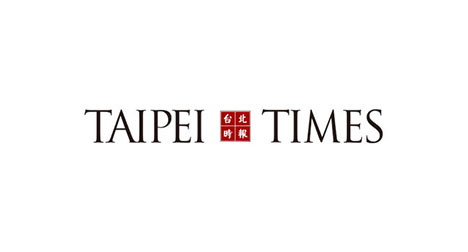

France to spell out nuclear plan
A researcher said that ‘the balance is shifting, including in countries such as Germany’ on the role of nuclear weapons in Europe’s strategic ambitions.
France, the EU’s sole nuclear power since Britain’s exit from the bloc, was to unveil how it intends to use its atomic arsenal as a deterrent. French President Emmanuel Macron, in an address to military officers graduating in Paris yesterday, was expected to recommit to upgrading France’s capacity, at a time when NATO allies, who would ordinarily look to the US in a nuclear standoff, worry about Washington’s retreat from the multilateral stage.
Ursula von der Leyen: betting on Franco-German unity in the European Commission
Germany's Ursula von der Leyen nominated to lead EU Commission.


Germany's Arms Export Ban Frustates European Partners
Germany's unilateral decision to halt all shipments of military equipment to Saudi Arabia has stopped 10's of billions of dollars worth of orders of joint European arms exports, bringing the question of deep arms export cooperation among European partners into high relief.


Macron Seeks a Dose of Charlemagne to Renew Merkel Partnership
When France and Germany sign a treaty on Tuesday in the historic border town of Aachen, it will be the culmination of 16 months of work by French President Emmanuel Macron to bring the anchors of Europe closer.
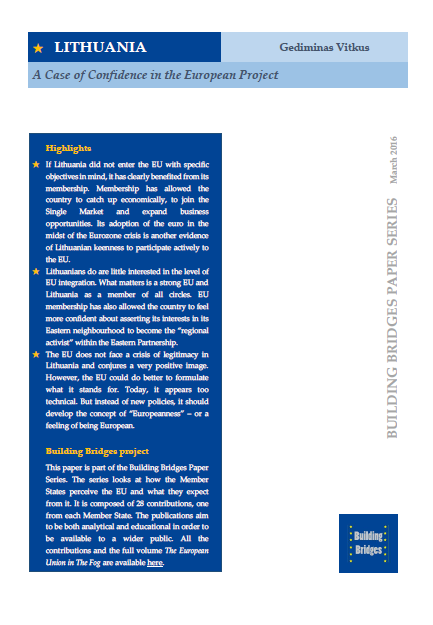
Lithuania: A Case of Confidence in the European Project
If Lithuania did not enter the EU with specific objectives in mind, it has clearly benefited from its membership. Membership has allowed the country to catch up economically, to join the Single Market and expand business opportunities. Its adoption of the euro in the midst of the Eurozone crisis is another evidence of Lithuanian keenness to participate actively to the EU.
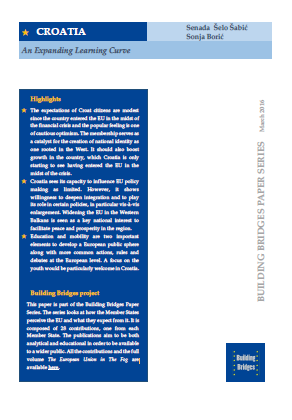
Croatia: An Expanding Learning Curve
The expectations of Croat citizens are modest since the country entered the EU in the midst of the financial crisis and the popular feeling is one of cautious optimism. The membership serves as a catalyst for the creation of national identity as one rooted in the West. It should also boost growth in the country, which Croatia is only starting to see having entered the EU in the midst of the crisis.
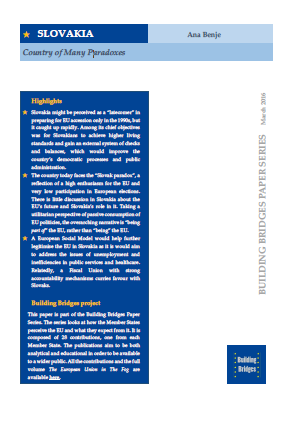
Slovakia: Country of Many Paradoxes
Slovakia might be perceived as a “latecomer” in preparing for EU accession only in the 1990s, but it caught up rapidly. Among its chief objectives was for Slovakians to achieve higher living standards and gain an external system of checks and balances, which would improve the country’s democratic processes and public administration.
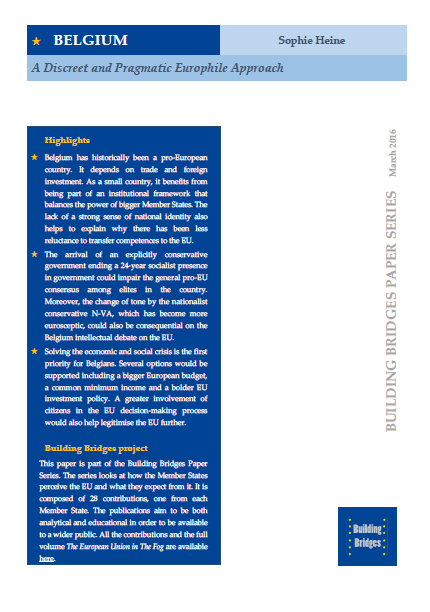
Belgium: A Discreet and Pragmatic Europhile Approach
Belgium has historically been a pro-European country. It depends on trade and foreign investment. As a small country, it benefits from being part of an institutional framework that balances the power of bigger Member States. The lack of a strong sense of national identity also helps to explain why there has been less reluctance to transfer competences to the EU.
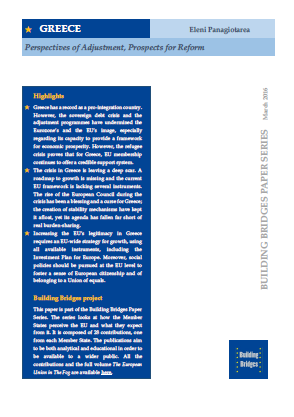
Greece: Perspectives of Adjustment, Prospects for Reform
Greece has a record as a pro-integration country. Yet, the sovereign debt crisis and the adjustment programmes have sapped the Eurozone’s and the EU’s image, especially regarding its capacity to provide a framework for economic prosperity. Still, the refugee crisis proves that EU membership continues to offer a credible support system within which it can expect economic aid, organisational backing and the protection of its borders.
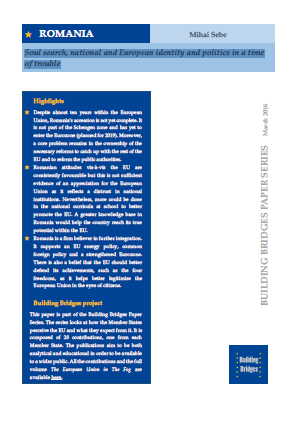
Romania: Soul Search, National and European Identity and Politics in a Time of Trouble
Despite almost ten years within the European Union, Romania’s accession is not yet complete. It is not part of the Schengen zone and has yet to enter the Eurozone (planned for 2019). Moreover, a core problem remains in the ownership of the necessary reforms to catch up with the rest of the EU and to reform the public authorities.
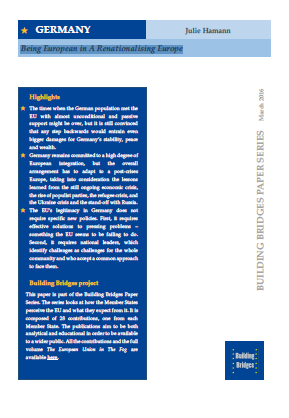
Germany: Being European in a Renationalising Europe
The times when the German population met the EU with almost unconditional and passive support might be over, but it is still convinced that any step backwards would entrain even bigger damages for Germany’s stability, peace and wealth.
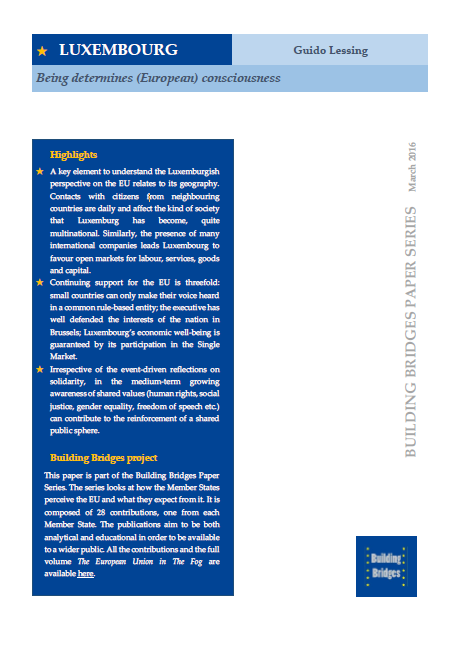
Luxembourg: Being Determines (European) Consciousness
A key element to understand the Luxembourgish perspective on the EU relates to its geography. Contacts with citizens from neighbouring countries are daily and affect the kind of society that Luxembourg has become, quite multinational. Similarly, the presence of many international companies leads Luxembourg to favour open markets for labour, services, goods and capital.
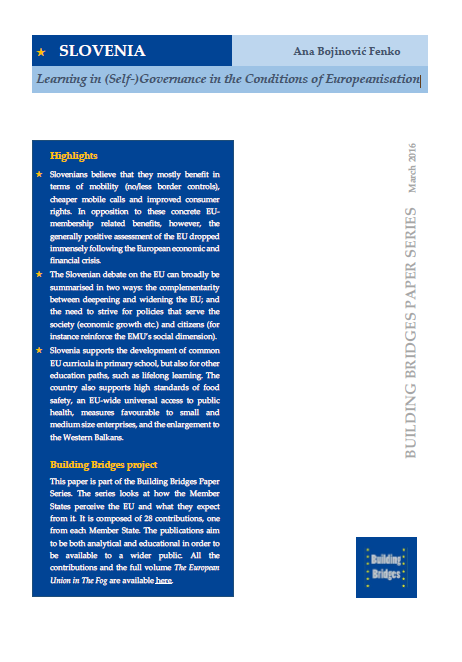
Slovenia: Learning in (Self-)Governance in the Conditions of Europeanisation
Slovenians believe that they mostly benefit in terms of mobility (no/less border controls), cheaper mobile calls and improved consumer rights. In opposition to these concrete EU-membership related benefits, however, the generally positive assessment of the EU dropped immensely following the European economic and financial crisis.
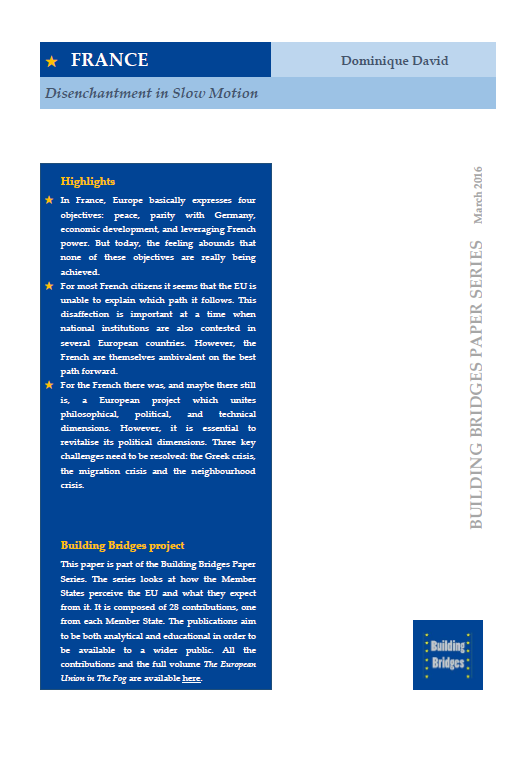
France: Disenchantment in Slow Motion
In France, Europe basically expresses four objectives: peace, parity with Germany, economic development, and leveraging French power. But today, the feeling abounds that none of these objectives are really being achieved.
Support independent French research
Ifri, a foundation recognized as being of public utility, relies largely on private donors – companies and individuals – to guarantee its sustainability and intellectual independence. Through their funding, donors help maintain the Institute's position among the world's leading think tanks. By benefiting from an internationally recognized network and expertise, donors refine their understanding of geopolitical risk and its consequences on global politics and the economy. In 2024, Ifri will support more than 70 French and foreign companies and organizations.












